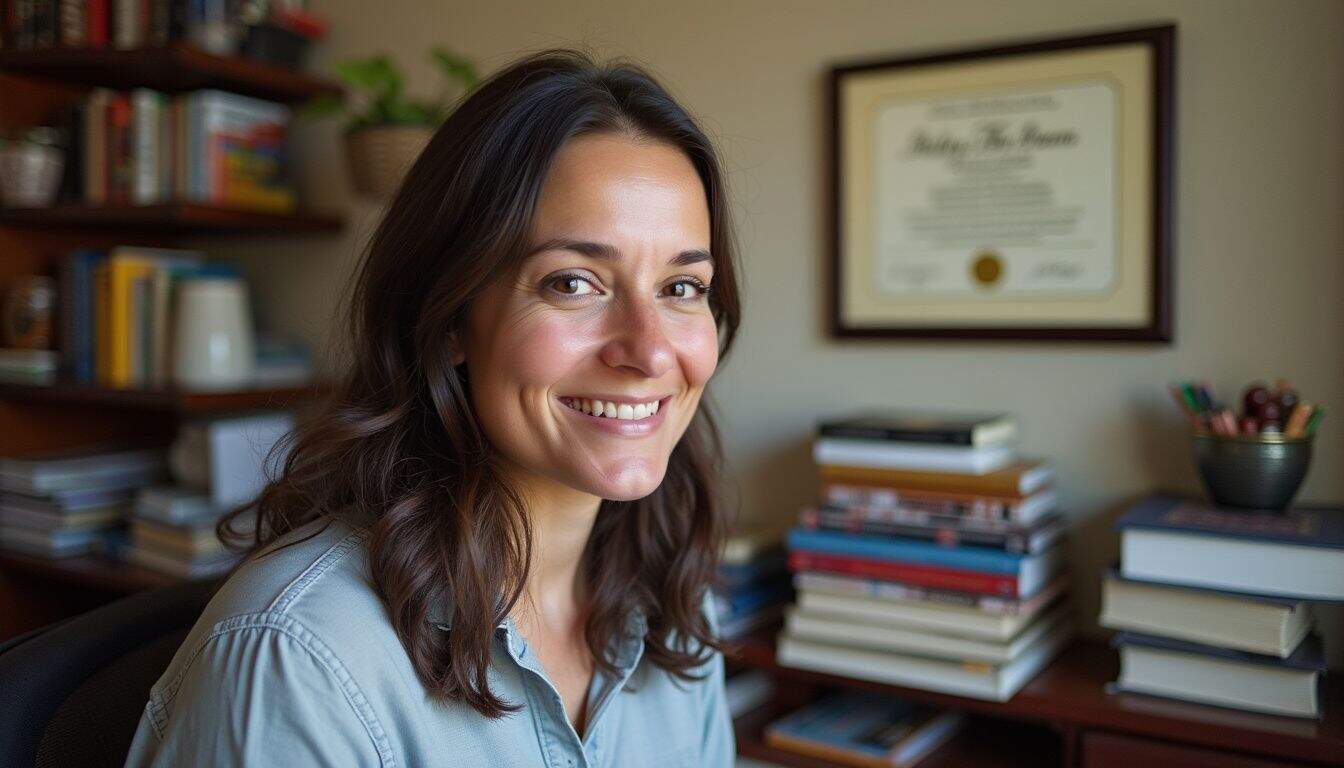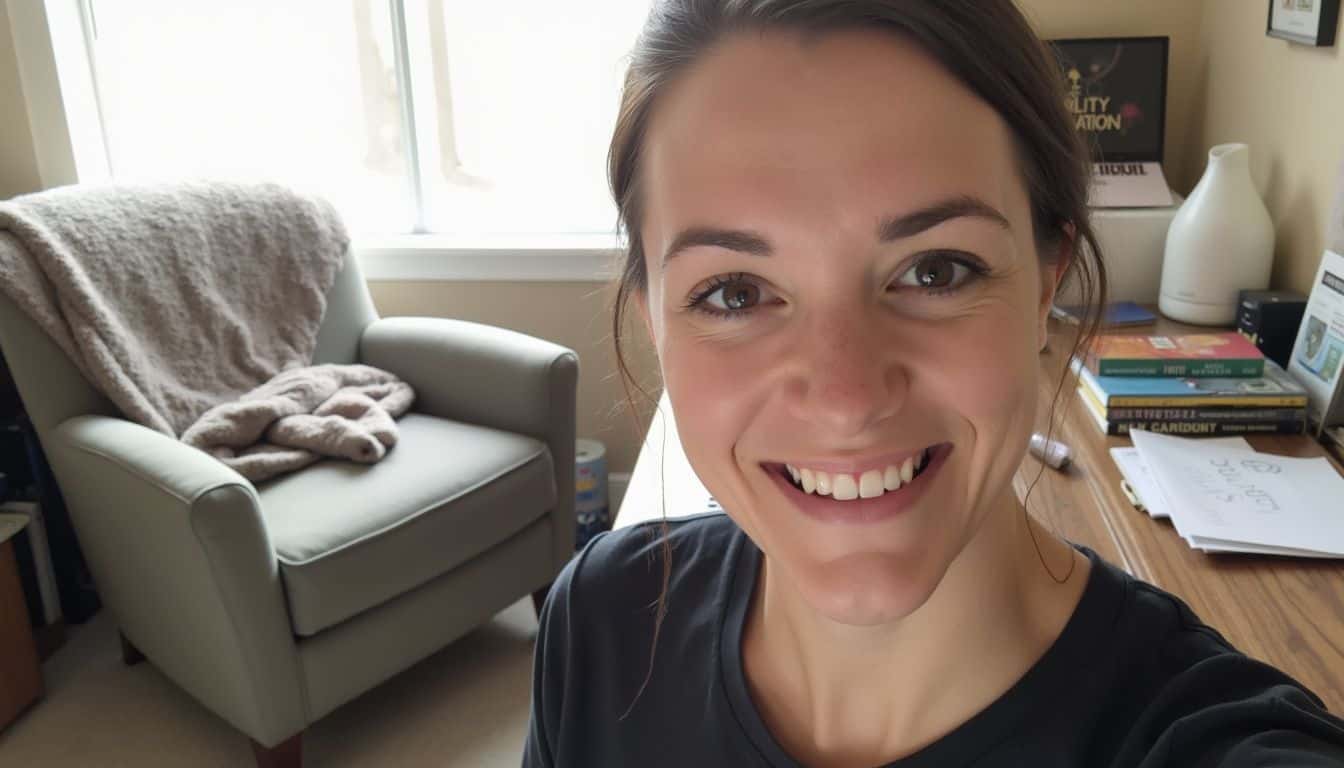Have you ever felt that deep calling to help people, but the path to a real career in mental health feels like a huge, confusing puzzle?
Maybe you’re the person everyone turns to for advice, but figuring out how to become a marriage and family therapist seems filled with complicated steps and unanswered questions.
You’re not just wondering about the classes you’ll need or how tough the exams are. You’re probably also thinking about the practical side, like whether the salary can support your family and fit your life.
Here’s a little secret: this career is more within reach than you might think. The U.S. Bureau of Labor Statistics reports that marriage and family therapists earn a median salary of around $63,780 per year, and the field is growing much faster than average.
If you’re ready for a clear, step-by-step guide designed for women who want to turn their passion for helping others into a profession, you’re in the right place. Let’s walk through it together.
Key Takeaways
You must earn a master’s degree in marriage and family therapy or a related field. Look for programs accredited by COAMFTE, as they require at least 300 direct client contact hours and prepare you for licensure.
To become a Licensed Marriage and Family Therapist (LMFT), you need to complete between 2,000 and 4,000 supervised clinical hours after graduation and pass the National Marital and Family Therapy Examination.
State licensing rules vary widely. For instance, California requires 3,000 supervised hours, while Florida requires 1,500. All states require ongoing continuing education to keep your license active.
The U.S. Bureau of Labor Statistics reports a 2024 median salary of $63,780 for family therapists, with top earners making over $111,610. Job growth is projected to be 13% between 2024 and 2034, which is much faster than average.
The profession is adapting to new technology. The LMFT Clinical Exam was recently shortened, and many states are adopting digital tools like TrackYourHours and Time2Track for logging clinical experience.
Table of Contents
Educational Requirements for Family Therapists

Your journey starts with the right education. You’ll need a master’s degree in counseling, psychology, or a related field to get started. These programs are where you’ll build your foundation in areas like family systems and human development.
What degree do I need to start a career in family therapy?

First things first, a bachelor’s degree is your entry ticket to any graduate program. While many students major in psychology or social sciences, schools are open to a wide range of undergraduate backgrounds. What they really look for is a strong academic record and any experience you have working with people.
To officially become a licensed marriage and family therapist (LMFT), you must earn a master’s degree. This could be a Master of Science (MS) or a Master of Arts (MA) in a field like marriage and family counseling or clinical mental health counseling.
During your master’s program, you’ll complete supervised clinical practice, known as a practicum. Most programs require between 150 to 500 hours of hands-on experience before you graduate. Schools with programs that are mft accredited programs are specifically designed to set you up for success as a professional counselor or clinical social worker.
A successful therapist starts by investing in education; every class builds your skills to support families facing tough chapters.
Which master’s programs are best for marriage and family therapy?

When you’re looking for a master’s program, one name you’ll see a lot is the University of West Alabama. Its Master of Science in Family Counseling is popular because it’s flexible and affordable, offering both online and on-campus options that you can often complete in one to two years.
Another great option, especially for working adults, is Northwestern University’s MFT program, which is known for its strong clinical placement support. It’s so important to choose a program that is accredited by the Commission on Accreditation for Marriage and Family Therapy Education (COAMFTE). COAMFTE accreditation ensures the program meets high national standards, which is a requirement for licensure in many states.
I earned my degree part-time while raising three teens, so I know how crucial flexibility is! A program that fits your life can make all the difference. Make sure the school you choose is recognized by employers and will prepare you for licensure as a licensed marriage and family therapist.
Clinical Training and Supervised Experience

This is where the textbook knowledge turns into real-world skill. Through hands-on practice, you’ll learn to manage actual therapy sessions with guidance from experienced mental health professionals.
How many practicum hours are required during graduate studies?

During your master’s program, you’ll need to complete supervised practicum hours. Most programs require between 150 to 500 hours, but it’s important to know what your state requires. For example, New York requires at least 300 client contact hours for licensure.
A pro-tip I always share is to start looking for your practicum site early. Placements at good community mental health agencies can be competitive, and this is where you gain invaluable experience with everything from couples therapy to substance abuse cases.
You’ll spend a portion of this time under direct supervision, with a licensed professional guiding you. It can feel like a lot to juggle, but those hours in the therapy room are where the real learning happens.
“You learn more from 10 minutes in the counseling room than 10 hours in the classroom.”
What is supervised clinical experience after graduation?

After you’ve graduated, the next big step is your post-degree supervised clinical experience. This is where you’ll put in the bulk of your hours to qualify for full licensure. Most states require between 2,000 to 4,000 hours of supervised work.
You’ll work in an approved setting, like a clinic or hospital, and meet regularly with a licensed supervisor, an experienced professional like an LMFT or psychologist who oversees your work. They’ll help you sharpen your skills and build the confidence you need for private practice.
Keeping track of all these hours used to be a nightmare of messy spreadsheets. Now, there are amazing digital tools that make it simple. Many therapists use software like Time2Track or PsyKey to log hours and generate reports, which keeps everything organized and ready for your licensing board.
Licensing and Certification

Getting your license is the final hurdle before you can officially practice as a licensed marriage and family therapist. This involves passing a national exam and meeting your state’s specific requirements.
How do I pass the licensing exam for family therapy?

The big test you’ll need to pass is the National Marital and Family Therapy Examination, which is administered by the AMFTRB. The best advice is to create a solid study plan three to six months before your test date.
Many people find success using dedicated exam prep programs. Companies like the Therapist Development Center and AATBS are popular because they offer structured study materials, audio lectures, and mock exams that are very similar to the real thing.
A helpful tip I learned from other therapists on forums like Reddit is to focus on *how* to answer the questions, not just memorizing facts. The exam often tests your clinical reasoning, so understanding the logic behind the “best” answer is key. For example, if a question mentions any risk of harm or medical issues, your first step is almost always to address safety or refer to a physician.
The only way to do great work is to love what you do. — Steve Jobs
What are the state-specific licensing requirements?

This is where things can get a little tricky, because every state has its own set of rules. For example, North Carolina requires you to complete 3,000 hours of supervised experience, while New York requires 1,500 post-degree hours.
Here’s a quick comparison of a few states to give you an idea of the differences:
| State | Total Supervised Hours | Additional Exams Required |
|---|---|---|
| California | 3,000 hours | California Law & Ethics Exam |
| Florida | 1,500 hours | Florida Laws and Rules course |
| Texas | 3,000 hours | Texas Jurisprudence Exam |
The best resource for this is your state’s licensing board and the American Association for Marriage and Family Therapy (AAMFT), which provides updated information for every state. You’ll also need to complete continuing education credits every renewal period to keep your license active, which usually includes a few hours focused on ethics.
Career Preparation

Once you’re licensed, a whole world of opportunities opens up. You can work in different settings, from a cozy private practice to a bustling substance abuse treatment center, and even specialize in areas that you’re passionate about.
How do I choose the right work environment as a family therapist?

The beauty of this career is the variety of places you can work. According to the U.S. Bureau of Labor Statistics, about 30% of licensed marriage and family therapists work in offices with other health practitioners, while another 24% are in individual and family services.
Many therapists eventually go into private practice because it offers the most flexibility, which is perfect if you’re balancing family life. Others thrive in the structured, team-based environment of a hospital or an outpatient care center.
Telehealth has also become a huge part of the field. Platforms like Talkspace and BetterHelp allow you to work from home, though the pay structure can be different from a traditional setting. Think about what kind of pace and schedule fits your life best. My first job was at a substance abuse treatment center, and while it was intense, the camaraderie with my team was incredible.
Choosing where you work is less about fancy job titles and more about matching your personality to the pace, people, and passion you bring every day.
What specializations can I pursue in family therapy?

Finding a niche can make your work incredibly rewarding and set you apart as an expert. Many therapists pursue advanced certifications in specific areas to deepen their skills.
Here are a few popular specializations:
- Gottman Method Couples Therapy: This is a research-based approach for helping couples. Becoming a Certified Gottman Therapist involves multiple levels of training and shows a high level of expertise.
- Emotionally Focused Therapy (EFT): Developed by Dr. Sue Johnson, EFT is a powerful model for working with couples by focusing on attachment and emotional bonds.
- Play Therapy: If you love working with children, becoming a Registered Play Therapist allows you to use play as a therapeutic tool to help kids process emotions.
- Sex Therapy: This requires specialized training and certification from organizations like AASECT to help individuals and couples with intimacy issues.
You might also focus on areas like addiction counseling or trauma recovery. Specializing not only allows you to follow your passion but can also lead to a stronger referral network and higher earning potential. Sometimes, a specialization can help you work with very specific issues, such as helping families navigate toxic daughter-in-law dynamics or other challenging relationship patterns.
Continuing Education

The learning never stops in this field! State boards require you to continue your education through workshops and training to stay current on best practices in areas like human development and psychological assessment.
What continuing education is required to renew my license?

To renew your LMFT license, you’ll need to complete a certain number of continuing education (CE) hours, typically every two years. The exact number varies by state but is usually between 20 and 40 hours.
A portion of these hours must be dedicated to Law and Ethics. Many states are also adding new requirements for training in specific areas like telehealth, cultural competency, or suicide prevention. You can find approved courses through organizations like the American Psychological Association (APA) or the California Association of Marriage and Family Therapists (CAMFT).
Online platforms like PESI and the Zur Institute also offer hundreds of approved courses, making it easy to get your hours done from home. As licensed clinical psychologist Dr. Emily Carter says, “Professional growth never stops.”
Which advanced certifications should I consider?

Beyond your required CEs, pursuing an advanced certification can take your career to the next level. These aren’t just for renewing your license, they establish you as an expert in a specific area of family therapy.
Think about the clients you most enjoy working with. If you find yourself drawn to complex trauma cases, a certification in Eye Movement Desensitization and Reprocessing (EMDR) could be a great fit. If you’re passionate about helping couples, becoming a Certified Gottman Therapist is a highly respected credential that involves three levels of training and a final certification track.
Other popular options include certifications in substance abuse counseling, clinical neuropsychology, or emotionally focused therapy (EFT). Organizations like Agents of Change Continuing Education offer hundreds of approved courses that can help you build these specialized skills and shape a career that truly reflects your passions.
Skills and Qualities of a Successful Family Therapist

It takes more than a degree to be a great therapist. Your natural ability to connect with people, listen deeply, and guide them through tough conversations is what truly makes a difference.
What communication and empathy skills are essential?
At the heart of every therapy session is active listening. As a licensed marriage and family therapist, your job is to hear not just the words being said, but the feelings and needs hidden beneath them. Empathy is your most powerful tool.
A simple technique I’ve found incredibly effective is “Reflective Listening.” It’s when you repeat back what you heard someone say in your own words. For example, if a client says, “I’m just so tired of fighting,” you might respond with, “It sounds like you’re feeling completely exhausted by the conflict.” This small act shows you’re truly hearing them and helps them feel understood.
Building rapport also means respecting different cultural backgrounds and setting clear, professional boundaries. When clients feel safe and seen, they open up, and that’s when healing can truly begin.
How important are problem-solving and critical thinking?
While empathy builds connection, your problem-solving skills are what help families create real change. Think of yourself as a detective and a coach combined. You use critical thinking to form a “case conceptualization”, which is just a fancy way of saying you develop a theory about what’s going on in the family system.
You’ll use proven therapeutic models to guide this process. For example, Solution-Focused Brief Therapy (SFBT) is a popular approach that doesn’t dwell on the history of the problem. Instead, it helps clients identify their strengths and focus on creating practical, forward-looking solutions.
The U.S. Bureau of Labor Statistics notes that therapists who combine sharp reasoning skills with empathy see better outcomes. This ability to analyze a situation, identify patterns, and guide a family toward a workable plan is what moves them from feeling stuck to feeling hopeful.
Job Outlook and Career Opportunities

The good news is that demand for family therapists is strong and expected to keep growing. Whether you want to work in a hospital, a school, or your own private practice, you’ll find plenty of opportunities.
Where do family therapists typically work?
Licensed marriage and family therapists work in all sorts of settings, including private practice, mental health centers, and outpatient clinics. While many work full-time, part-time and flexible schedules are very common, which is a huge plus.
The latest data from the U.S. Bureau of Labor Statistics shows that salaries can vary quite a bit by work environment. Those working for state governments tend to earn the most, with a median salary of $89,030. Outpatient care centers are next at around $73,230, followed by individual and family services at $59,550.
I’ve also seen more therapists find rewarding roles in less common places, like in corporate Employee Assistance Programs (EAPs) or working with military families. And of course, the rise of telehealth has opened the door to building a practice right from your home office.
What is the demand for family therapists in different regions?
The future looks bright for this profession! The U.S. Bureau of Labor Statistics projects that employment for marriage and family therapists will grow by 13% between 2024 and 2034, which is much faster than the average for all occupations. That translates to about 7,700 job openings each year.
Demand is strong across the country, but it’s especially high in areas with a growing awareness of mental health or in rural communities that are often underserved. In fact, many accredited master’s degree programs report job placement rates of over 95%.
When I was finishing my degree, I received my first job offer before I even graduated because the need in my area was so high. This is a field where your skills are truly wanted and needed.
Steps to Advance Your Career

Once you’re established, there are many ways to grow. You can deepen your clinical skills by earning a doctorate, mentor the next generation of therapists as a supervisor, or even step into teaching and research.
How can a doctorate help advance my career in family therapy?
Earning a doctorate, like a Ph.D., Psy.D., or DMFT (Doctor of Marriage and Family Therapy), can open up new doors. I saw a colleague of mine pursue her Psy.D. while raising her kids, and now she leads a clinical team at our agency.
A doctorate gives you a significant edge, positioning you for leadership roles, university teaching positions, and often a higher salary. It allows you to become an expert in a specific area, whether that’s developmental psychology or a complex model like emotionally focused therapy.
- A Ph.D. is typically focused on research and is great if you want to contribute to the academic side of the field.
- A Psy.D. is more focused on advanced clinical practice and leadership.
- A DMFT is a professional doctorate specifically designed for MFTs who want to become leaders in clinical practice and supervision.
What research or teaching opportunities are available?
If you love the academic side of therapy, a doctorate can lead to a fulfilling career in teaching or research. Universities are always looking for licensed marriage and family therapists with real-world clinical experience to join their faculty.
As a professor, you could mentor graduate students, lead seminars on topics like substance abuse or emotionally focused therapy, or conduct your own research. Many doctoral graduates also get involved in scholarly work, like reviewing articles for professional publications such as the Journal of Marital and Family Therapy.
You don’t have to wait for a doctorate to start sharing your knowledge, though. A great way to begin is by presenting a workshop at a state-level AAMFT conference. It’s a wonderful opportunity to network and shape the next generation of therapists.
How Will the Path to Becoming a Family Therapist Change in 2025?

This field is always adapting, and a few exciting changes are on the horizon. The LMFT Clinical Exam was recently updated, dropping from 170 to 150 questions as of September 2024. I remember the stress of those long practice tests, a shorter exam is definitely a welcome change!
Another big development is the move toward greater license portability. The Counseling Compact is an agreement between states that allows licensed professional counselors to practice in other member states without getting a whole new license. While it’s currently focused on LPCs, similar compacts for MFTs are being developed, which will make it much easier to practice across state lines.
States are also embracing technology, with digital tools for tracking clinical hours becoming the norm. As a licensed marriage and family therapist (LMFT), staying organized with your documentation is more important than ever. The U.S. Bureau of Labor Statistics also suggests that employers may add more training requirements in the coming years to keep up with evolving standards in mental health care, especially around telehealth and substance abuse.
People Also Ask
What education do I need to become a licensed marriage and family therapist (LMFT)?
You’ll start with a bachelor’s degree in a field like psychology or human development, then you must earn a master’s degree from a program accredited by COAMFTE, which typically involves about 60 credit hours of study in family systems and mental health.
Can I study online to become a marriage counselor?
Yes, many respected universities, such as Pepperdine and Syracuse, offer accredited online programs for your master’s degree, which can help you save on living costs by not having to relocate. These online programs cover the same core curriculum as their on-campus counterparts.
Do I need special skills to work as an LMFT?
Excellent communication skills are crucial, along with strong organizational skills for managing client cases. You’ll also need to be skilled in active listening and setting healthy boundaries to effectively empathize with clients dealing with issues like substance abuse or difficult family systems.
How does financial aid work for these programs?
Most universities offer financial aid, and you can also apply for specific programs like the National Health Service Corps (NHSC) Scholarship, which may cover your tuition in exchange for working in an underserved area after graduation.
What is the job outlook according to the U.S. Bureau of Labor Statistics?
The field is growing much faster than average, with the U.S. Bureau of Labor Statistics projecting a 15% increase in jobs for marriage and family therapists between 2022 and 2032, creating strong opportunities in private practice and mental health centers.
Will becoming an LMFT involve telemarketing calls under the Telephone Consumer Protection Act?
No, schools may only contact you if you provide express consent on their websites, as required by the Telephone Consumer Protection Act.
References
https://www.umassglobal.edu/blog-news/become-licensed-marriage-family-therapist (2022-03-16)
https://www.psychology.org/rankings/best-masters-programs-in-family-counseling/
https://www.op.nysed.gov/professions/marriage-and-family-therapists/license-requirements
https://www.psychology.org/counseling/licensure/new-york/
https://www.counselingpsychology.org/mft-mentorship-supervision/
https://www.counselingpsychology.org/lmft-exam-preparation/
https://research.com/careers/north-carolina-mft-licensing-certifications-careers-and-requirements
https://agentsofchangeprep.com/blog/how-to-become-a-marriage-and-family-therapist-mft/
https://www.psychology.org/careers/family-counselor/ (2025-09-23)
https://www.bbs.ca.gov/licensees/cont_ed.html
https://www.precisionfamilytherapy.com/post/how-family-counseling-improves-problem-solving-skills (2025-05-14)
https://positivepsychology.com/how-to-become-a-therapist/ (2025-02-12)
https://www.bls.gov/ooh/community-and-social-service/marriage-and-family-therapists.htm
https://careersinpsychology.org/employment-outlook-guidance-marriage-family-therapists/
https://research.com/careers/how-to-become-a-marriage-and-family-therapist-in-connecticut
https://careers.utah.edu/peaks-and-valleys/82/ (2022-05-26)
